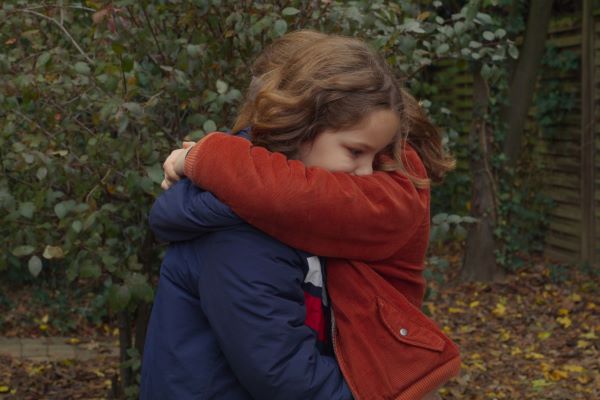After the swooning masterpiece Portrait of a Lady on Fire, Céline Sciamma returns to the type of story that characterised early work like Water Lilies and Tomboy; that of a young protagonist caught at a pivotal moment of their developing identity. The short and very sweet Petite Maman, an incredibly charming and benign ghostly fable, speaks volumes in measured whispers about death, grief, and acceptance.
Eight-year-old Nelly (Joséphine Sanz) has just lost her maternal grandmother. Along with her parents Marion (Nina Meurisse) and her never-named father (Stéphane Varupenne), she travels to her grandmother’s house to clear out the dead woman’s things. Apparently struggling with her grief, Marion vanishes. The same day Nelly meets a little girl her age building a tree house. The girl (Gabrielle Sanz) looks very much like Nelly and says her name is Marion. She invites Nelly home and leads her to a house identical to her grandmother’s house, only accessed through a different gate. Once inside, Nelly discovers this house also contains a younger version (Margot Abascal) of her deceased relative.
It would be tempting to bracket Petite Maman as a ‘lesser’ Sciamma, if such a thing is possible. Given its brief runtime and almost ambient narrative it could be mistaken for a wispy dandelion clock of a picture. But Sciamma is a master at filling tiny moments full to bursting with emotion and meaning, and when she cites Ghibli guru Hayao Miyazaki as an influence, it becomes clear that this is a delicate magic-realist My Neighbour Totoro that resonates like a struck gong in exactly the same way. And like Totoro, it’s free of any real threat, but aches with a wistful melancholy that the magic only partially disperses.
The casting of twins Joséphine and Gabrielle Sanz is as Nelly and ‘Little Mum’ Marion is crucial to the film’s approach. The natural almost supernatural bond between twins is utilised in the scenes of connection and play between the two girls, and enforces the idea of generational continuity. It’s clear the scenes in which they act out little scenarios or make a mess while cooking pancakes are unscripted and unforced, both adopting a facsimile of adulthood that really get to the heart of the story.
And this is principally a story about a mother and daughter, and one told in a way we’ve never seen before. Although Nelly’s father is present and kindly, he’s peripheral to the story. Except that is for one lovely moment where he shaves at his daughter’s behest. This serves two thematic purposes. As the removal of hair is symbolic of a loss of power, this instance of the self-removal of hair is a tacit secession of the importance of the father’s role in the story. He’s there as observer and facilitator. And there is also the theme of the familiar being seen in a different way. After he’s done, Nelly says a cheery, ‘Salut!’ as if meeting a stranger for the first time.
There is a strong case to be made that Céline Sciamma is quite simply one of the finest filmmakers working today. Given self-imposed limited means and a rigorous Covid-limited crew, she – and superlative collaborators like cinematographer Claire Mathon (Portrait of a Lady on Fire, Spencer) and editor Julien Lacheray (Portrait, Girlhood, Proxima) have created something really special. Petite Maman may hark to Miyazaki in its sense of unfettered childish wonder, but it’s also Ozu-like in its gentle wisdom and its intimate portrayal of both the ties and the limitations of familial love. Quite beautiful.
Screening as part of the French Film Festival 2021
